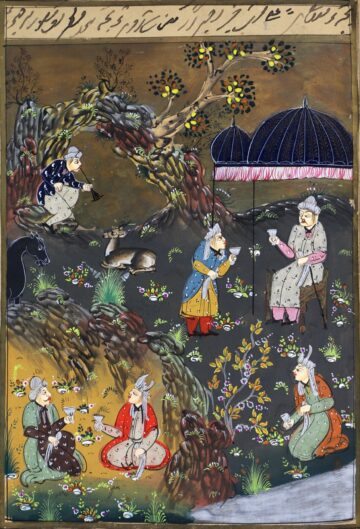The IIS’s new Board of Governors met staff and shared their thoughts on, and early plans for, the Institute on March 5th in an online town hall.
The meeting was a chance for the governors, who took up their roles in December 2020, to share their aspirations after their recent inductions and initial Board meetings, as well as an opportunity for staff to get to know them a bit better on a personal level, a process otherwise complicated by the Covid-19 pandemic. The Board will meet IIS students at a second Town Hall on March 19th.
Professor Ali Asani and Professor Tashmin Khamis, on behalf of the members, reported a very successful first meeting held virtually with the Chairman of the Board, His Highness the Aga KhanA title granted by the Shah of Persia to the then Ismaili Imam in 1818 and inherited by each of his successors to the Imamate., on February 18th. During the meeting, the Institute’s operational plan and budget for the year were presented—and signed off—alongside a set of guiding principles for the workings of the new Board, which His Highness wholeheartedly endorsed.
These principles focus on three main areas: mutual trust and respect; responsibility; and inclusion and belonging. Mutual trust and respect, Professor Asani emphasised, was important to sustain and develop an IIS culture built on the sharing of ideas. Inclusion and belonging were also essential in this respect, to ensure an openness of discussion and free exchange of creative thought.
Guiding Principles of the new board of governors
Mutual Trust and Respect
- Integrity in our decision making and conduct.
- Conducting our activities with a commitment to transparency.
- Creating the space and freedom for constructive challenge and debate and listening to other points of view.
Responsibility
- Striving for excellence in all we do.
- Being clear about our roles as Governors and the responsibilities of the senior management team and staff.
- Relying on facts, contextual realities, and thoughtful analysis as the basis for sound decision making.
- Focusing on the needs of IIS’ beneficiaries and stakeholders in all our policies and decisions.
- Sustaining financial probity and fiscal responsibility.
Inclusion and Belonging
- Building an inclusive and equitable environment.
- Creating a thriving community and a place where everyone can belong.
To improve efficiency and to encourage greater collaboration between different areas of the Institute, the number of Board-led committees has been reduced and a new committee covering all Jamati Programmes has been formed. The remit of the Academic Committee has been broadened and it will have an increased frequency of meetings going forward. The existing committees in Finance and HR, and the Constituency Studies Advisory Group will continue with new members from the Board.
Alongside this, short- to medium-term working groups have been established to address some of the IIS’s key areas of focus: AKDNThe Aga Khan Development Network (AKDN) is a contemporary endeavour of the Ismaili Imamat to realise the ethics and social conscience of Islam through institutional action. More Linkages; Climate and Sustainability; Digital Strategy; Management Succession Planning; Review of Resource Allocation; and Student and Alumni Engagement.
Achieving Taught Degree Awarding Powers has also been earmarked as an important initiative. His Highness commented at the Board meeting in February that obtaining this status would serve the IIS well.
The Board also underlined the importance of harnessing technology and reflecting and building on the expansion in digital resources and offerings expedited by the Covid-19 pandemic, to expand the IIS’s international reach, particularly across the global JamatAssembly or religious congregation; also a term used by the Nizari Ismailis for their individual communities..
Before outlining the planned initiatives, the governors reflected on the Institute’s progress so far. “Overall, the IIS has achieved a level of standing and maturity across a lot of different areas of activity in what is a relatively short space of time, and done it in a way which has got the Institute in a position that’s also financially stable, and I think that’s thanks to the leadership and guidance and support we’ve had from His Highness since the beginning and the wonderful work of the team,” said Naguib Kheraj, who was re-appointed to the Board in December.
A number of governors identified the quality of the Institute’s research and publications in Ismaili and Islamic studies and its associated academic reputation as a particular strength. They also emphasised the impact of this in breaking down barriers; the IIS’s academic work is “a door for understanding … that has built bridges between diverse Islamic traditions and communities, and non-Muslim communities,” said Dr Shogufa Mir Malekyar.
Professor Nacim Pak-Shiraz felt that the intellectual tradition and legacy of the last Ismaili centres of learning and its vast libraries in AlamutFortress of the Nizari Ismailis in northern Iran, which fell to the Mongols in 654 AH/1256 CE., after their destruction and hundreds of years of polemical writing against the IsmailisAdherents of a branch of Shi’i Islam that considers Ismail, the eldest son of the Shi’i Imam Jaʿfar al-Ṣādiq (d. 765), as his successor., had “finally found a home”.
Others emphasised the importance of people—students, scholars and staff. “It’s the staff and the students and the alumni that make the IIS. It’s not a building or a bunch of books, it’s a group of people, and that’s what I would highlight,” said Naguib Kheraj.
Addressing staff directly, Tashmin Khamis concluded “We look forward to working with you with open discussion, we look forward to your creative ideas, we look forward to benchmarking always to best practice, to create that strong institution with a strong purpose.”







